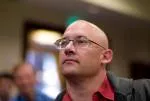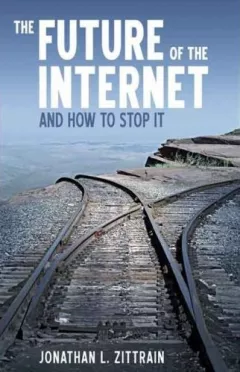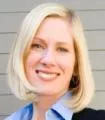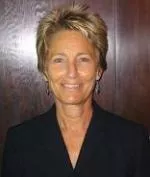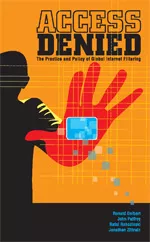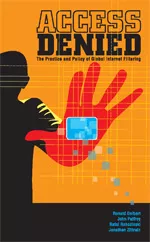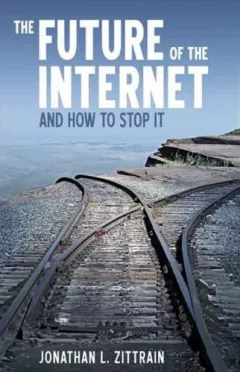
Berkman@10
The Berkman Center for Internet & Society at Harvard Law School is proud to celebrate its tenth year as a research program founded to explore cyberspace, share in its study, and help pioneer its development. Running through the 2007-2008 academic year, the celebration includes an event and distinguished speaker series; major releases of books by Berkman projects and people; a culminating conference - "The Future of the Internet" - on May 15-16, 2008; and a gala on May 16.
Through research, events, and discussion, Berkman@10 considers “The Future of the Internet” - to celebrate the work we have done together over the past decade, and to look ahead to what we hope to accomplish collectively in the next.
The Berkman Center was founded at a time when the future of cyberspace seemed to be both boundless and overwhelmingly positive. Our belief was, and is, that there are values embedded in the openness of the Internet.
At the same time, we understand that new configurations give rise to new problems. The reaction of societies to these problems will determine how much of technology's potential can be realized. Mapping the open and the proprietary in cyberspace and modeling its special virtues, while being sober about its dangers, are at the heart of our shared inquiry.
Our primary activities are teaching and learning, as is true of any traditional university-based research center. But we also seek to elaborate upon that tradition using the technologies that we study. We have committed to build out into cyberspace as we study it. We have developed code that supports teaching, learning, and self-expression and have participated in erecting new kinds of institutions that seek -with mixed results - to lend order to a space that appears at first glance to be ungovernable.
The promise of cyberspace is just as great as it was ten years ago, if not greater. Some of the challenges we face in studying it, and in building out into it, have changed; others persist. The more we learn, from one another and from our colleagues who study and build this space, the more our excitement for our work grows.
Multimedia from this event
Berkman@10: Opening Remarks
Berkman at 10 opening remarks by Harvard Law School Dean Elena Kagan, Berkman Faculty Director Terry Fisher and Berkman Founder Charles Nesson.
Berkman@10: Civic Engagement and the Youth Vote
The Berkman Center co-hosted a Forum event with the Harvard Kennedy School Institute of Politics which focused on Youth, Politics, and Civic Engagement in the 2008 election year.
Speakers/panelists included: Jesse Dylan, HopeActChange.org and Director/Producer of the will.i.am "Yes We Can" video. Wes Hill, co-Founder of HopeActChange.org. Ari Melber, The Nation Magazine. Jeff Frazee, National Youth Coordinator, Ron Paul 2008. John Palfrey, Berkman Center
Berkman@10: Open Innovation
The Internet and the widespread availability of sophisticated digital design tools are radically changing best practice in product and service development. What was until recently a process concentrated within producer firms is now becoming democratized and widely distributed. This fundamental change has widespread consequences. What is the impact of these developments on innovation processes, business models, and government policies?
Berkman @ 10: The Dilemma of Games
How can video games -- which rely so heavily on giving users meaningful choices -- promote pro-values such as responsibility, charity, or sacrifice? Can video marry these values to the kind of "systems thinking" at which they're particularly good and which are becoming more vital in our networked world? WGBH, the renowned public television station, is launching a transmedia TV show and game that tackles these questions head-on. In this workshop, you'll help have a chance to shape this project that aims to teach children about environmental systems and their own choices within that system.
Berkman@10: The Language of Openness
Nothing matters more than what the Net is. Yet when we call it a "space" or a "stage" or "pipes," we frame it with metaphors that yield very different purposes, laws and business models—also different futures. What different laws and regulation do we get by framing the Net in terms of real estate ("domains," "sites," "commons"), transport ("packets," "content," "pipes") or theater ("audience," "experience")? How do these different frames guide debate over net neutrality, open infrastructure, governance, regulation, public good and business opportunity? Are there other ways of framing the Net that are more useful?
Berkman @ 10:The Musician & The Scientist
Five years after the launch of the first Creative Commons licensing suite, Creative Commons and Science Commons invite the community to expand the framework through new tools, or protocols: CC+ to signal external transactions, CC0 to waive rights, and Science Commons Open Data Protocol. Are user communities invited to appropriate, extend and customize the licenses, creating a participatory code? Should musicians self-organize and create their own structures complementary to Creative Commons licensing to collect remuneration, or can collective society schemes accommodate a possible paradigm change from public performance vs private use to commercial vs non commercial rights? How can scientific communities and government develop models to open scientific data? Is online distribution for music, and the semantic web for science, shifting legal paradigms toward “commercial rights reversed” and “no rights reserved”?
Berkman@10: Digital Natives
John Palfrey and Urs Gassser explore some of the myths surrounding how young people use new technologies. Does it make sense to talk about a distinctive global culture of young people -- Digital Natives -- who have only known life in a digital age?
Berkman@10: Netizenship
There is a need for new technologies and social structures that allow users to work creatively and collaboratively to understand what's happening on their network -- how it is impacting them, and how they are impacting it. This session introduces a cluster of technologies that seek to diagnose and improve PC health and network connectivity and empower users to understand and affect the future of the Internet.
Berkman@10: Future of the Internet (Take 1)
Jonathan Zittrain talks about the internet within the context of his book: "The Future of the Internet -- And How to Stop It".
Berkman@10: Future of the Internet (Take 2)
Charles Nesson moderates a discussion with Esther Dyson, Michael Fricklas, and Reed Hundt.
Berkman@10: Talking Points Memo
Joshua Micah Marshall speaks during Berkman@10 lunch about the future of the publishing and news industry in regards to the internet and the forces at play.
Berkman@10: Politics
Berkman Center Executive Director John Palfrey moderates a discussion with the audience on whether the internet is good for democracy.
Berkman@10: Cooperation
Berkman Center Faculty Co-Director Yochai Benkler and Founder and Chair of the Board of Trustees of the Wikimedia Foundation Jimmy Wales discuss the necessity of cooperation on the internet today.
Berkman@10: Transparency & Government
It has been argued that new information technologies and other online tools have the capacity to enhance political transparency and the accountability of government officials, processes, and institutions to their citizens. How does the Internet interact with, protect or endanger democratic engagement and trust?
Berkman@10: Network Neutrality
Yochai Benkler, Terry Fisher, and Tim Wu decide to engage the issue of "Network Neutrality" at a breakout session during the Berkman@10 conference.
Berkman@10: Battle for the Internet
In the battle for the Internet: Who are the adversaries? Where are the battlefields? James Morris leads a discussion on the existent and coming clashes in cyberspace.
Berkman@10: Onward!
John Palfrey moderates as audience members ask questions of what the Berkman Center should study in the next 10 years.
You might also like
- storyHappy OneWebDay!
- storyHomeward!
- storyOnward!
- storyBerkman@10 Events

